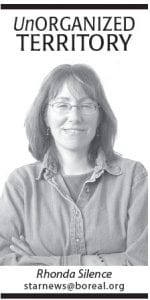It’s tough to be a government official. It’s tough to have to tackle sensitive issues with an audience. It’s tough to have tentative discussion broadcast to the community, when it is just that, tentative.
However, that is what makes democracy work. A citizen government is only effective if citizens are involved. And sometimes that gets forgotten. That is what the press is for. That is why news organizations around the world participate in “Sunshine Week.”
Sunshine Week 2011 is March 13 – 19. The week is a time when news people around the globe pause for a few minutes and think about the importance of open government.
So, it is ironic that this week the Cook County – Grand Marais Economic Development Authority (EDA) needed a reminder about the Open Meeting Law.
There wasn’t anything shady going on. In fact, the EDA started to do what has been done hundreds of times by hundreds of governmental bodies. They wanted to close a meeting to the public without adequate justification under the Open Meeting Law, Minn. Statutes, Chapter 13D. The reason for wishing to close the meeting seemed sound. The EDA wanted to review applicant resumes for the Superior National at Lutsen golf course general manager position. They wanted to talk about the pros and cons of each applicant without that discussion getting back to those individuals. They wanted to protect the applicant who may not want his or her current employer to know he or she is looking for another job.
The problem is, the Open Meeting Law clearly defines the reasons a public meeting can be closed. It can be closed for a number of things—to consult an attorney on pending litigation; for preliminary charges against an employee; to discuss student educational data and more. But reviewing job applications is not one of the reasons.
When called on the matter, the EDA did the right thing. They contacted the county’s HR director and their attorney for advice. They were advised that they should not close the meeting. To protect the job seeker’s identities, they were advised to refer to the applicants as resume No. 1, resume No. 2 and so on. It immediately became a very awkward process.
The EDA decided to turn the applications over to the golf course committee—which does not include a quorum of the EDA board—to be narrowed down and brought back to the full EDA board. Perfectly acceptable, according to Minnesota Newspaper Association Attorney Mark Anfinson.
However, when the list is narrowed down and applicants are chosen for interviews, they are then finalists and under the Data Privacy Act, their names become part of the public record.
Why does it matter? It really doesn’t matter too much in this case. The EDA wasn’t trying to hide anything from the public. They were just trying to be fair to the applicants.
But there are other boards or commissions—hopefully not in Cook County—that do try to use closed meetings and secret discussions to decide matters that should not be decided in the dark. Thanks to events like Sunshine Week, the light is on. It is the newspaper’s duty to print the news and raise hell.
Wilbur F. Storey



Loading Comments